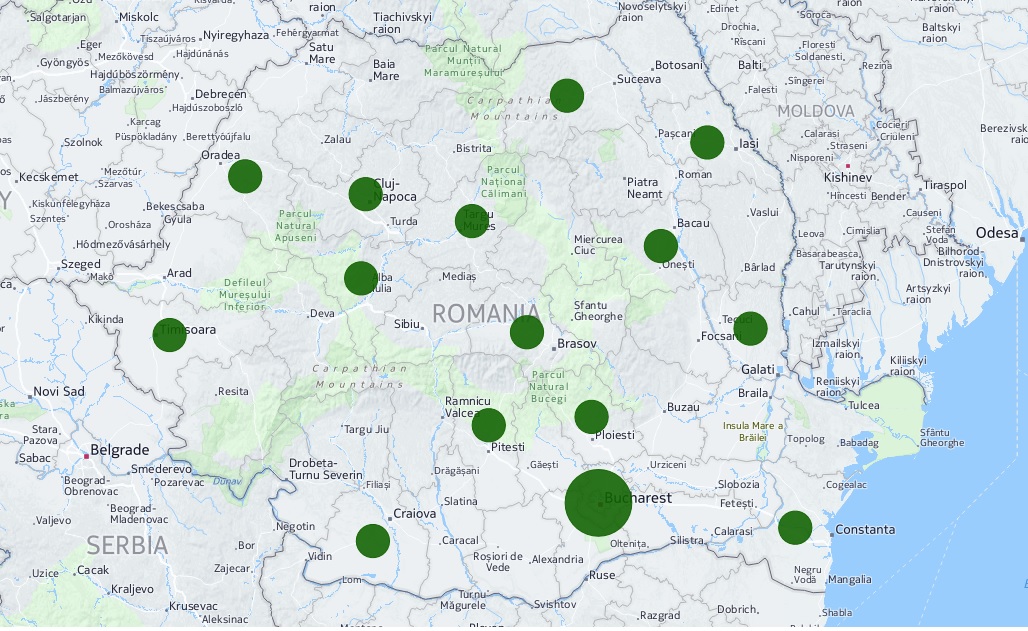Norway: 1 central office, 65 employees, a €6.8 million budget, and able to solve 25 percent of complaints over the phone.
Romania: 15 branch offices, over 100 employees, a €2 million budget, and, in 2013, only 101 investigations out of 17,047 complaints.
These data were recently discussed at a conference organized in Bucharest by the Association for the Defense of Human Rights in Romania – the Helsinki Committee (APADOR-CH). The Romanian ombudsperson and representatives of several human rights institutions from Norway attended the conference.
The project was aimed at informing citizens about the institution of the ombudsperson and encouraging them to use this office whenever their rights are violated by other state institutions. The conference marked the end of the project "We need a more effective ombudsperson," which was carried out in Romania during the last 12 months.
Here is some comparative information about the Norwegian and Romanian ombudspersons:
Norway
The following institutions are responsible for human rights protection in Norway:
- an ombudsperson appointed by the Parliament, very similar to the Romanian ombudsperson;
- an ombudsperson on equality and anti-discrimination;
- a children's ombudsperson, established in 1981, the first of its kind in the world;
- a National Institute for Human Rights.
The Norwegian ombudsperson is somewhat similar to the Romanian one. However, as underlined during the conference by Gunnar M. Ekeløve-Slydal, a representative of the Norwegian Helsinki Committee (APADOR-CH’s counterpart), Norway has a very dynamic civil society, truly involved in the human rights field, with NGOs often being real partners of state institutions in human rights defense.
- Submitting complaints to the Norwegian ombudsperson is free of charge, easy and quick. It is a real option to obtain remedies for infringement of rights, without having to go to court.
- The mandate of the ombudsperson was established by the Norwegian Constitution in 1814, designating an institution which must ensure that the government respects human rights and does not commit rights violations against its citizens. The ombudsperson cannot, however, appeal against decisions of the Parliament or the judiciary.
- In 2015, the Norwegian ombudsperson rejected 54 percent of the complaints it received from citizens; the other 46 percent were found to be admissible. The ombudsperson criticized governmental decisions in 146 cases. 25 percent of the complaints it received in 2015 (359 cases) were solved through a phone call with the state institution against which allegations of violation of rights were submitted.
The Norwegian Ombudsperson has an annual budget of €6.8 million and 65 employees. The institution has only one office, in Oslo; its employees have to travel often across Norway, which, in terms of size, is similar to Romania.
Romania
The following institutions are responsible for human rights protection in Romania:
- an ombudsperson appointed by the Parliament;
- a National Council for Combating Discrimination;
- a Romanian Institute for Human Rights, an institution founded in 1990, about which information such as who leads it, what budget it has and what it achieved in its 26 years of existence are completely unknown to the public.
Citizens can submit complaints free of charge to the Romanian ombudsperson as well. The institution was first provided for in the 1991 Constitution, and its implementation norms were adopted in 1997.
Achievements of the Romanian ombudsperson:
- According to the statistics available on the website of the ombudsperson, it has little activity, with little impact. Between 2009-2013, the institution reacted to less than 1 percent of the total number of complaints that it received. In 2013, it conducted only 101 investigations, after having received 17,047 complaints from citizens.
- In recent years, the ombudsperson was requested 241 times to submit unconstitutionality exceptions before the Constitutional Court of Romania. It did so in only six of these cases. Moreover, even in the few cases where it did order investigations and it made recommendations, the ombudsperson lacked will and ability to follow-up on their implementation.
- A survey conducted by IRES shows that 53 percent of Romanians have little or very little confidence in this institution. A study conducted by ANBCC within this project revealed that 80 percent of the Romanian citizens consider that the ombudsperson has little or no visibility in the public space, and 82 percent of those questioned said they never addressed the institutions.
According to the statement of Victor Ciorbea, the current Romanian Ombudsperson, who attended the conference, his institution has 140 staff members, with only 100 of the vacancies currently occupied. He also stated that the ombudsperson has 14 offices across Romania and a central office in Bucharest, having an annual budget of €2 million.
Both in Romania and in Norway, ombudspersons are politically appointed. In Norway, however, politicians in power do not dare to appoint members of their own parties, said Ingrid Egeland Thorsnes, a legal adviser to the ombudsperson for equality and anti-discrimination in Norway. She gave the example of the current children’s ombudsperson, who is from an opposition party and whose knowledge on the rights of minors is widely respected across the political spectrum in Norway.
The "We need a more effective ombudsperson" project was carried out by APADOR-CH, ActiveWatch and the National Association of Citizens Advice Bureaux (NACAB) and funded through EEA 2009-2014 grants EEA, within the NGOs Fund in Romania. For official information on the EEA and Norway Grants go to www.eeagrants.org.





